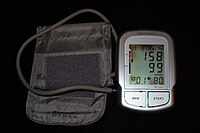
Photo from wikipedia
The prognosis of refractory hypertension is largely unknown due to its low prevalence. This study aimed to investigate the prognosis of refractory hypertension and compare it with those of resistant… Click to show full abstract
The prognosis of refractory hypertension is largely unknown due to its low prevalence. This study aimed to investigate the prognosis of refractory hypertension and compare it with those of resistant and nonresistant hypertension. We retrospectively analyzed the data of 16,284 participants with hypertension who underwent ambulatory blood pressure (BP) monitoring between 2012 and 2019 at a tertiary center. Uncontrolled BP was defined as a 24-h BP ≥ 130/80 mmHg as assessed by ambulatory BP monitoring. Resistant hypertension was defined as uncontrolled BP despite the use of three antihypertensive medications, including a diuretic or the use of ≥4 drugs regardless of BP control. Refractory hypertension was defined as uncontrolled BP despite the use of ≥5 antihypertensive medications. Among 16,284 patients with hypertension (mean age 59.2 ± 15.5 years, 52.7% men), 1501 (9.2%) and 150 (0.9%) patients had resistant and refractory hypertension, respectively. The prevalence of chronic kidney disease, end-stage renal disease, heart failure, previous stroke, left ventricular hypertrophy, and the riser/nondipper patterns of circadian BP rhythm progressively increased from patients with nonresistant hypertension to patients with resistant hypertension to patients with refractory hypertension. During a median follow-up of 3.9 years, the risk of cardiovascular mortality progressively increased from patients with nonresistant hypertension to patients with resistant hypertension (hazard ratio 1.62, 95% confidence interval 1.16–2.26) to patients with refractory hypertension (hazard ratio 5.22, 95% confidence interval 3.04–8.96). In conclusion, refractory hypertension, defined as uncontrolled ambulatory BP levels, was associated with a higher risk of all-cause and cardiovascular mortality than nonresistant or resistant hypertension.
Journal Title: Hypertension Research
Year Published: 2022
Link to full text (if available)
Share on Social Media: Sign Up to like & get
recommendations!